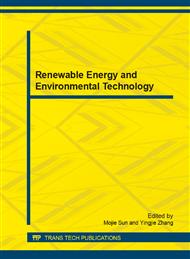p.182
p.188
p.192
p.199
p.204
p.209
p.213
p.217
p.221
Comfort Fusion Evaluation of the Indoor Thermal Environment Based on KPCA and Genetic Neural Network
Abstract:
For the problem of complicated nonlinear relationships among the parameters of heat comfort index PMV, KPCA (Kernel Principal Component Analysis) is used to do the feature extraction. On the basis, KPCA+BP and KPCA+GNN are utilized to forecast the heat comfort level. Simulation results show that KPCA can extract the nonlinear uncorrelated sample data, and KPCA+GNN are evaluated best with high accuracy.
Info:
Periodical:
Pages:
204-208
Citation:
Online since:
October 2013
Authors:
Keywords:
Price:
Сopyright:
© 2014 Trans Tech Publications Ltd. All Rights Reserved
Share:
Citation:


